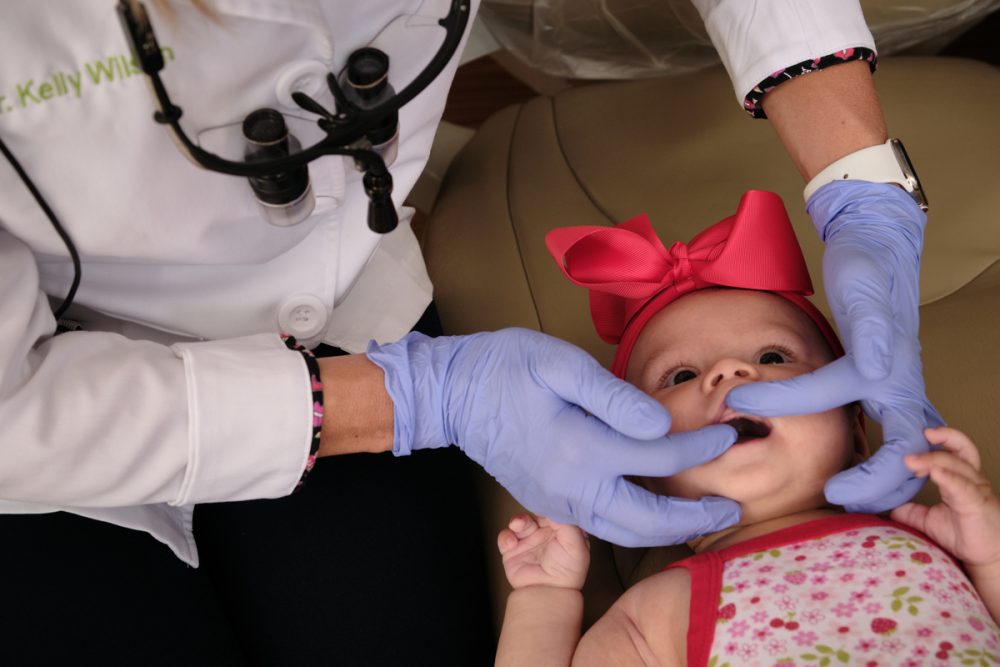
Risks Of Snoring And Sleep Apnea
May 2, 2023
What Causes Jaw Muscle Pain
May 22, 2023Key Takeaways:
Signs of Tongue Tie:
Symptoms include difficulty breastfeeding, trouble articulating certain sounds, messy eating, and limited tongue movement.
Effects on Development:
Severe cases can lead to speech delays, eating difficulties, and dental misalignments, affecting a child’s growth.
Treatment Options:
A frenectomy (tongue tie release) can resolve the issue, often coupled with Myofunctional therapy to support oral development.
Parents are often surprised if a doctor or dentist suggests their child may have a tongue tie. Given the often serious nature of this treatable condition, we want all parents to be aware of the signs of tongue tie.
Like most medical conditions, tongue tie is highly variable and requires personalized dental and medical care. Please remember, this article is a starting point as you research this condition and not a substitute for seeing a dentist or doctor.
Before we go into detail about the signs of tongue tie, it may help to understand better what it is. Too often, people say they feel “tongue tied” when they are at a loss for words without thinking about the fact it is a potentially serious issue affecting many people from birth.
What is Tongue Tie?
A tongue tie is a congenital condition that restricts the tongue’s movement. The degree of restriction varies. Sometimes, the condition doesn’t cause any significant problems, while other times, it interferes with eating, breathing, and speaking. According to the Mayo Clinic, when someone has a tongue tie or ankyloglossia, an “unusually short, thick or tight band of tissue” known as the lingual frenulum “tethers the bottom of the tongue’s tip to the floor of the mouth.”
Since the degree of tightness in the lingual frenulum varies, the symptoms also vary. To further complicate things, some people have an anterior tongue tie closer to the front of the mouth, while others have a posterior tongue tie further back into the mouth.
Tongue Tie Sometimes Interferes With Healthy Development
While some people with mild tongue ties may reach adulthood with minimal problems, it is important to understand some of the possible issues caused or exacerbated by more severe cases of tongue ties. These include:
- Trouble latching while breastfeeding is often a first sign. The consequences can be: risk of poor nutrition, pain to the mother, gassy baby
- Trouble learning to speak when peers seem to be excelling.
- Trouble eating or swallowing during childhood and beyond.
- Trouble brushing back teeth, gagging
- Dental misalignments
- Problems with just about any other oral activity like licking an ice cream cone, playing brass and wind instruments, or kissing.
Signs of Tongue Tie
You may be able to guess some of the tongue tie symptoms based on the problems it may cause. For example, parents who notice their infant has trouble breastfeeding may talk with their child’s healthcare provider or a lactation consultant, which leads to an exam and diagnosis.
Other signs of tongue tie include:
- Inability to fully open the mouth and lift the tongue to the roof of the mouth
- Trouble sticking the tongue out beyond the lower teeth
- Heavy drooling
- Messy eating
- Extra difficulty articulating certain sounds, including “d,” “l,” “r,” “s,” “t,” “th,” and “z.”
- Picky eaters
- The trouble with just about any other oral activity
Diagnosing and Treating Tongue Tie
Sometimes it is hard to diagnose tongue tie, especially posterior tongue tie, where the tongue is tethered further toward the back of the mouth. You may hear people refer to posterior tongue tie as a “hidden tongue tie” since it is harder to notice and diagnose. When the tether is closer to the front of the mouth, that is known as an anterior tongue tie.
Fortunately, tongue tie can be treated with a simple surgical procedure called a frenectomy which is more casually known as tongue tie release. Doctors or dentists may perform a frenectomy on infants without the risk of sedation. In children and adults, they use anesthetic. Sometimes orthodontists discover that a frenectomy would be beneficial to free the tongue for healthier jaw and mouth alignment since the tightness can cause gaps between teeth or other forms of misalignment.
Since a child is born with tongue ties, there are not any specific lifestyle risk factors, so you can’t prevent it from happening. Like other congenital conditions, it can run in families, so if you suspect your child has a tongue tie, please mention any family history if known. While it may seem simple to diagnose, the reality is sometimes it is, and sometimes it isn’t. Sometimes it can go undiagnosed into adulthood.
Occasionally, adults with very mild tongue tie don’t even know it since they just learned to compensate as they grew up. This doesn’t mean that untreated tongue tie doesn’t have negative consequences for some of those adults. Some signs of tongue tie in adults include:
- Unexplained tension in the neck, jaw, or tension headaches
- Grinding teeth or clenching of the jaw
- Trouble sleeping or snoring
- Trouble swallowing medication or pills
- Slow eating
- Habitual mouth breathing
- Trouble moving the tongue or sticking it out
- Trouble speaking, pronouncing certain sounds, articulating
Sometimes adults benefit from a frenuloplasty or from a special form of therapy known as myofunctional therapy, which involves training the muscles of the face, throat, and mouth.
However, it is best to detect and treat in children to reduce the development of compensations and affect facial formation. Cases severe enough to interfere to cause eating problems or trouble learning to talk may interfere with development, growth, and weight gain and create health issues and unnecessary obstacles that may follow a child throughout life.
In addition to the surgery, Myofunctional therapy is frequently beneficial and part of treatment. Training the facial muscles that contribute to healthy swallowing, chewing, breathing, or speaking helps establish healthy habits and improve quality of life.
If you notice any symptoms or signs of tongue tie, be sure to see your child’s pediatrician or dentist. People are sometimes surprised to learn that dentists often are the first to notice and diagnose it during a child’s early dental checkups. Dentists are also among the allied health professionals who may treat tongue tie surgically or through Myofunctional therapy.
If you live in or near Charlotte, you may be pleased to learn that Charlotte, NC’s own Southview Dentistry specializes in helping children and families through tongue ties as well as other oral health concerns. We also proudly offer Myofunctional therapy since we believe in the value of this lesser-known but often effective treatment.




